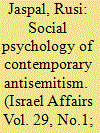|
|
|
Sort Order |
|
|
|
Items / Page
|
|
|
|
|
|
|
| Srl | Item |
| 1 |
ID:
144678


|
|
|
|
|
| Summary/Abstract |
Israel and the Islamic Republic of Iran have had a problematic relationship for the last four decades. Despite their tense relations, Israel is home to thousands of Persians and Iran has the second largest Jewish population in the Middle East. There are social, political and psychological obstacles to dual identification. Using qualitative thematic analysis and Identity Process Theory, this article examines the construction and management of Persian/Iranian and Jewish/Israeli identities among these groups. The following themes are discussed: (1) the challenges and maintenance of dual identification, (2) breaking down boundaries between identities, and (3) Persian-Iranian or Jewish-Israeli? Establishing coherence in identity. Results suggest that, while the social and political institutions in Iran and Israel construct barriers to dual identification, individuals deploy creative strategies for constructing an ethnic identity that acknowledges both components of their heritage. The implications for self-identity are discussed.
|
|
|
|
|
|
|
|
|
|
|
|
|
|
|
|
| 2 |
ID:
098225


|
|
|
| 3 |
ID:
190046


|
|
|
|
|
| Summary/Abstract |
This article focuses upon the social psychological aspects of antisemitism. Empirical research into three forms of antisemitism is reviewed through the lens of social psychological theories of social representation, intergroup relations and identity processes. Across research, perceived threat from Jews and Israel is a recurrent theme. The proposed integrative model suggests that negative social representations of Jews and Israel that accentuate intergroup threat can in turn have implications for identity processes at an individual level, mainly by curtailing feels of self-esteem, self-efficacy, continuity and distinctiveness. Identity threat can lead the individual to react defensively by engaging in antisemitism.
|
|
|
|
|
|
|
|
|
|
|
|
|
|
|
|
| 4 |
ID:
152533


|
|
|
|
|
| Summary/Abstract |
The Shi’a Imami Nizari Isma’ili Muslims have often been considered the “poster child” for pluralistic integration (Cayo 2008). This ethos has been inculcated within members of the community, with its adherents seeing themselves as a diverse and multi-ethnic collective. Nevertheless, despite this purported pluralism, social research on the Isma’ilis has primarily focused on the diasporic and post-diasporic migrant communities of South Asian descent, the ‘first and second-generation immigrants,’ in the Euro-American context (Mukadam and Mawani 2006, 2009; Nanji 1983, 1986). The experiences of co-religionists in other contexts have often been neglected. This study examines how members of the self-described geographically and socially isolated Isma’ili community in Australia construct their identity vis-à-vis the larger, global, Isma’ili community, and how they have responded to the potential of identity threat given the arrival of another group of Isma’ilis with a differing migratory history integrating into the extant community. Using the approach of identity process theory, this study examines how salient features of identity are constructed amongst the Australian Isma’ilis, how religion and identity take on multiple meanings within the Australian Isma’ili context, and, finally, sheds light on the self-sufficiency of this community despite geographic and social isolation.
|
|
|
|
|
|
|
|
|
|
|
|
|
|
|
|
|
|
|
|
|